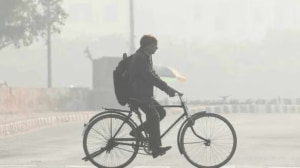GBS outbreak in Pune: ‘Beyond water contamination, unregulated urban expansion has compounded the problem’
Contaminated water sources have been identified, emphasising the urgent need for strict hygiene measures.
 Dr Avinsah Bhondwe (Express Photo)
Dr Avinsah Bhondwe (Express Photo)The Guillain-Barré Syndrome (GBS) outbreak in Pune has intensified, with 158 suspected cases and five suspected deaths reported as of February 2. Of these, 127 have been confirmed, with 48 patients in intensive care and 21 on ventilators. The outbreak is concentrated in areas with inadequate sanitation, with 83 cases emerging from newly added villages in Pune Municipal Corporation (PMC). Contaminated water sources have been identified, emphasising the urgent need for strict hygiene measures. Dr Avinash Bhondwe, former IMA president and practicing doctor in Pune, discusses the outbreak’s causes, preventive actions, and the need for government intervention to curb its spread.
Q: What are the key factors contributing to the recent surge in Guillain-Barré Syndrome (GBS) cases in Pune?
A: The primary concern here is the alarming state of water sanitation in newly incorporated municipal areas. Several villages near Khadakwasla Dam, now part of Pune Municipal Corporation, still lack access to properly treated drinking water. They depend on borewells and untreated wells, where the water is merely bleached rather than filtered, creating a high risk of bacterial and viral contamination. Recent water quality tests revealed that multiple sources were contaminated with Campylobacter jejuni and norovirus, both known to cause severe gastrointestinal infections. These infections can, in some cases, trigger an autoimmune response, leading to GBS.
Beyond water contamination, unregulated urban expansion in Pimpri-Chinchwad and surrounding areas has further compounded the problem. As rapid development outpaces infrastructure improvements, basic amenities like water supply and sewage disposal are compromised. Many residential zones rely on borewells located dangerously close to septic tanks, increasing the likelihood of cross-contamination. Improper drainage and lack of regular water quality monitoring have made these areas hotspots for waterborne diseases. The combination of these factors has created an environment where dangerous pathogens thrive, potentially escalating the outbreak if left unchecked.
The situation needs rigorous surveillance, stricter hygiene regulations, and systematic water purification to prevent further escalation of the crisis.
Q: Can GBS spread to other parts of state if hygiene measures remain inadequate?
A: Absolutely. GBS itself is not contagious, but the infections that can trigger it, such as bacterial gastroenteritis, can spread easily through contaminated water and unhygienic food. Poor drainage systems, broken pipelines, and improper sewage disposal create the perfect conditions for infections to multiply. Unless strict hygiene measures are enforced, other cities like crowded Mumbai could also report similar cases in the near future.
Q: How significant is the role of water and food safety in preventing such outbreaks?
A: Food safety is crucial. Many people in urban areas, particularly students and daily-wage workers, rely on street food vendors. These vendors often use untreated water, store food improperly, and operate in unhygienic conditions. Most of them are unregulated and not subjected to health inspections. This creates an easy pathway for bacterial and viral infections to spread.
The Food and Drug Administration (FDA) must take proactive measures to regulate food vendors, conduct routine inspections, and ensure that food handlers follow basic hygiene protocols. Without strict enforcement, these issues will persist, making future outbreaks inevitable.
Q: What steps should be taken immediately to prevent further cases?
A: First, authorities need to prioritise providing clean drinking water. Pune’s municipal system must ensure that all households, including those in newly incorporated areas, receive properly filtered and treated water. Second, regular sanitation checks should be conducted to identify and fix leaks in drainage and water supply pipelines.
Additionally, the FDA and municipal health departments should work together to monitor food vendors and enforce hygiene standards in eateries and markets. Food handlers must be screened for infections, and awareness campaigns should be launched to educate the public about the risks of consuming contaminated food and water.
Q: Have you seen similar sanitation issues in other urban areas?
A: Yes, Pune is not an isolated case. Across India, many rapidly urbanising areas face similar challenges. Unchecked urban growth often leads to improper water management and sanitation infrastructure. Just recently, I documented instances in Pune where water supply pipelines were laid through sewage drains, leading to cross-contamination. Such instances are found in cities like Mumbai, Nagpur and Nashik as well. If these infrastructural gaps are not addressed, we might see similar outbreaks in multiple districts.







